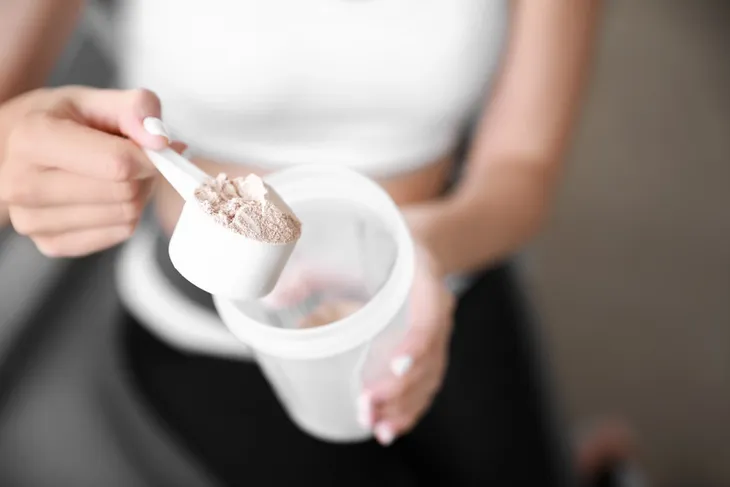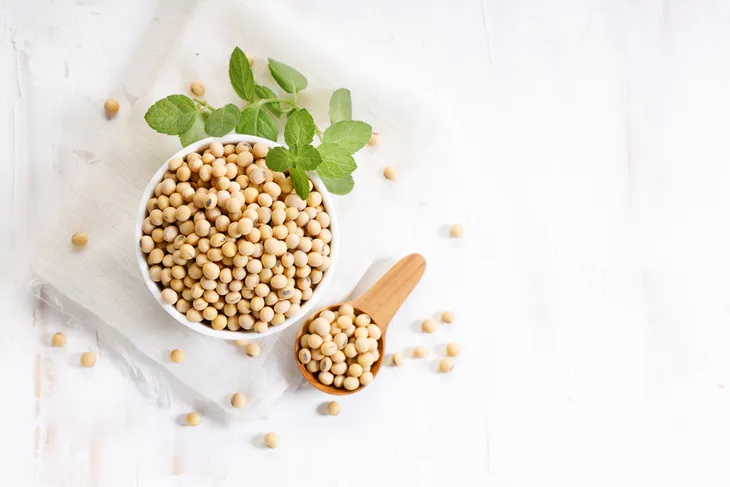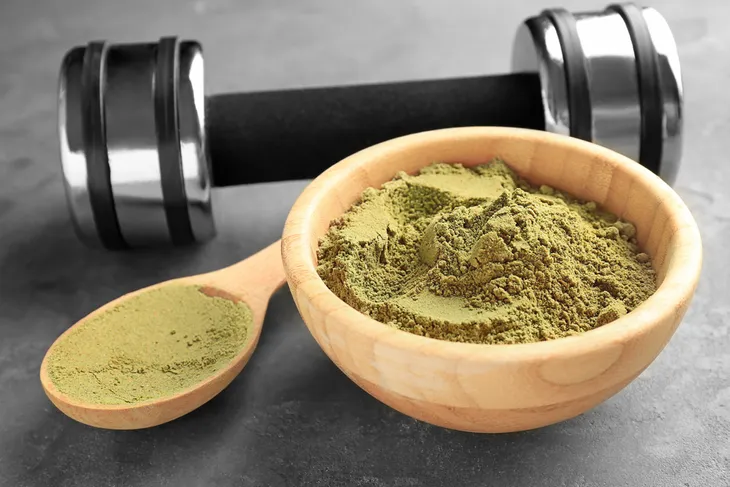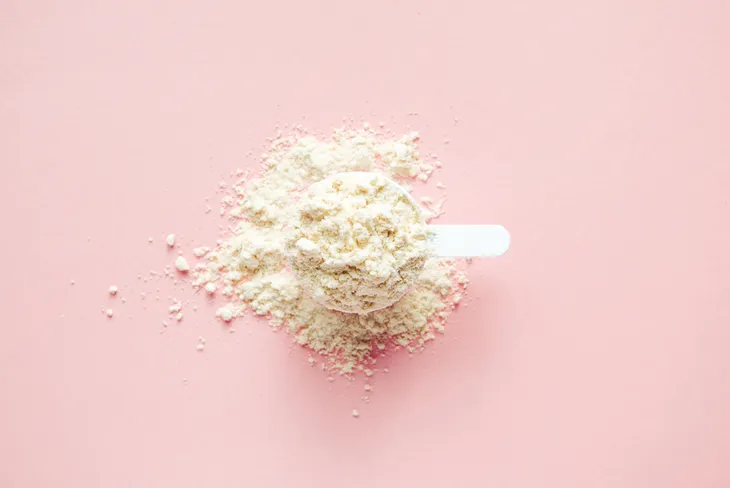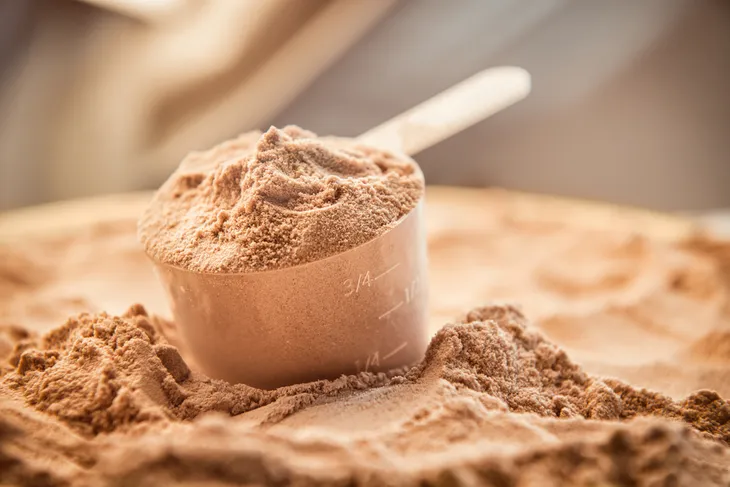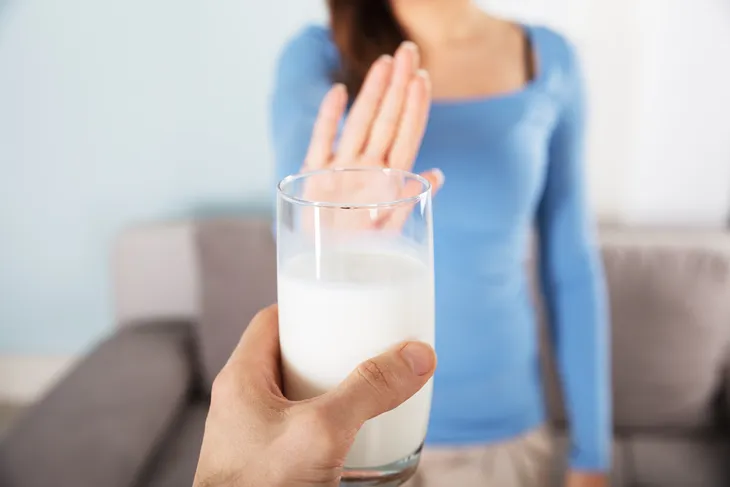- There can be a lot of differences between protein powders, but the general principle remains the same. Protein powders are concentrated sources of protein from plant or animal foods.
- There are many different types from whey and casein protein to plant-based options like pea and soy protein.
- Choosing the right protein powder for you will depend on your dietary restrictions, health goals, and budget.
Maybe you’re looking to enhance an already healthy diet. Maybe you’re hoping to recover faster from an extra-long gym session. Or maybe you’re looking for a low-cost, low-maintenance alternative to cooking. There really are a lot of reasons to integrate protein powder into your general health routine.
The uninitiated might assume the far wall lined with giant plastic jugs are filled with the same thing, but that couldn’t be further from the truth. Protein powders can vary substantially, from the way that they’re manufactured, right down to the source of their protein. To learn more about those differences and what that might mean to you, keep on reading.
What Is Protein Powder?
There can be a lot of differences between protein powders, but the general principle remains the same. Protein powders are concentrated sources of protein from plant or animal foods. They’re designed to be easily dissolvable and serve as an easy to prepare delivery system for one of the body’s most critical building blocks.
Protein powders come in a variety of forms. Protein concentrates can contain upwards of 80-percent protein, and protein isolates can contain as much as 95-percent protein. There are protein hydrolysates too which, due to an additional manufacturing process, are absorbed much more quickly.
Why Is Protein Powder Important?
Have you ever wondered why your favorite local health food store dedicates so much of its retail space to protein powder? I’m sure they make a lot of money selling it, but demand insists on protein powders being widely available. The global protein supplement market is valued at over 20-billion dollars because it works.
Getting enough protein is critical to your body’s ability to build muscle, repair tissue post-workout, and create critical enzymes and hormones. It’s good for your bones and skin. Consuming it also helps you feel fuller longer, which can positively impact a person’s ability to maintain a healthy weight or lose a couple of pounds.
Whey Protein
The process of cheesemaking separates milk into cheese curds and, you guessed it, whey. That whey is an incredibly high source of protein, and due to its high levels of branched-chain amino acids (BCAAs), it digests very quickly.
It’s important to note that whey protein isn’t the perfect solution for everybody. Sure, it absorbs fast and is relatively cost-effective, but the lactose it contains can turn some people’s stomachs. The amount of lactose whey protein contains can vary, which is why it’s always important to read the labels of whatever you decide to put in your body.
Pea Protein
The popularity of this protein form is growing by the day. Just like its cousin whey, regular consumption of pea protein can stimulate muscle growth and reduce muscle breakdown due to its BCAAs. It may not absorb as fast as whey or offer as much brand variety, but pea protein contains a comparable amount of protein per scoop without any allergens.
Most of the pea protein we drink is sourced from Europe and North America. It’s produced from yellow peas by way of a process that involves shelling and milling the harvested peas before separating the pea’s other ingredients. You’ll notice there are no animals involved, which makes pea protein popular among vegans and vegetarians.
Soy Protein
Soy protein is meat and allergen-free too, though admittedly not most people’s first choice. The data tells us that soy protein isn’t nearly as good as whey at synthesizing protein for muscle. There is some concern about soy’s phytate content, as well as its effect on a person’s thyroid function.
It’s available in both concentrated and isolated form and is made in much the same way as pea protein. It’s also very budget-friendly.
Hemp Protein
Don’t let unfamiliarity dissuade you from giving this plant-based protein source the old college try. It’s a fantastic source of omega-3 and omega-6 fatty acids, iron, magnesium, potassium, and of course protein.
There are some questions surrounding hemp’s amino acid profile. Hemp seeds have less of the essential amino acid lysine, which may render it a relatively poorer quality protein source. It also contains less protein per serving than both soy and pea proteins.
Brown Rice Protein
Brown rice protein doesn’t face all the same issues that hemp does. For one, it’s a lot richer in protein, offering 24-grams per serving on average. However, it’s still not quite as effective at building muscle as whey protein.
Brown rice protein has a high fiber content which also means it can take longer to digest compared to fast-absorbing protein powders such as whey. High fiber and slower digestion also means it may cause bloating or gas. But that doesn’t mean it’s not worth trying. On the plus side, it is another vegan-friendly option and may also help with blood pressure levels, heart health, and inflammation.
Egg White Protein
Powder or whole, eggs are an incredible source of protein and a suitable stand-in for those that don’t have the stomach for whey. Egg white protein packs an average of 25-grams of protein per scoop and includes all nine of the amino acids that promote lean muscle growth.
Obviously, egg protein powders aren’t vegan-friendly. And as great a protein source as it is, egg protein powder doesn’t seem to be as satiating, offering less potential than both casein and pea protein to reduce a person’s appetite.
Casein Protein
Casein can be a powerful addition to your healthy diet. Sourced from milk, casein is digested remarkably slowly. This slow digestion results in a slow-and-steady supply of amino acids to your muscles for up to 4-hours after ingestion.
Its slow-digestion profile means it’s typically used differently than some of the other powders we’ve already discussed. It’s frequently consumed before bed to help the body recover overnight, and may produce the best results when used in combination with post-workout whey supplementation.
Mixed Plant Protein
Mixed plant proteins are made up of a combination of plant-based proteins. The plant-based protein sources that each tub of powder contains can vary. Because they rely on a crafted mix of plant-based sources, mixed plant protein powders can offer a full spectrum of amino acids and enzymes, which makes them incredibly efficient sources of protein.
Vegans and vegetarians should be wary though. Just because it says plant-based doesn’t mean it’s entirely vegan. Just keep that in mind and do your research to make sure you aren’t buying a powder you can’t use.
Tip: Know Your Goals
Before you bust out your wallet, consider first what you hope to gain out of your protein powder. Maybe you’re trying to add muscle, lose weight, or supplement a vegan diet. There are a lot of reasons to begin buying protein powder and a variety of products catered to each.
If you want to lose weight, choose a powder with less sugar. Whey protein is the perfect complement to a rigorous workout routine. Plant-based proteins may not be the most efficient, but they are serviceable protein supplements to the vegan diet.
Tip: Know Your Body
So much of your protein powder decision is going to depend on personal factors. Allergies may force you away from whey, while medical conditions like diabetes may eliminate jugs that have too much sugar. If you’re at all unsure about which type is safe for you, ask your doctor.
It doesn’t matter if you’re new to protein supplementation, trying out a new brand, or looking to make the switch to plant-based powders, you should always be mindful of any negative changes to your digestion and energy levels. Journaling how your body feels each day can help you track those changes too.
Tip: Know Your Budget
Nobody knows your body as well as you do. Nobody knows how much you’re willing to spend either. In this space, cost doesn’t always determine quality. Some powders are more affordable due to the availability of their protein source and the cost-effectiveness of extraction.
You should generally expect to pay more for the higher-end stuff though. The powders at the very top of the cost pyramid usually contain higher quality ingredients and less filler. Keep in mind that you can usually save by buying in bulk.
 Shutterstock/ADragan
Shutterstock/ADraganThe Takeaway
Between the manufacturing process, the protein source, and its seemingly endless variations, it’s safe to say there’s a lot to know about protein powder. Don’t be overwhelmed though! Not unlike finding the right diet, or building a functional exercise routine, picking the perfect protein powder is a matter of educated experimentation.
So take what you’ve learned here today to get started, but don’t stop trying new protein powders until you find one that perfectly compliments your dietary restrictions, health goals, and budget.




